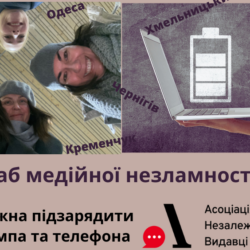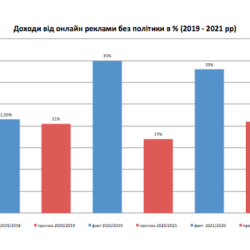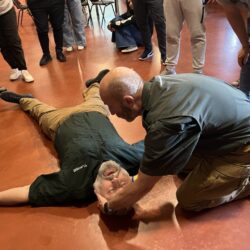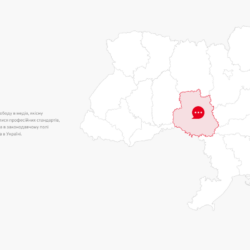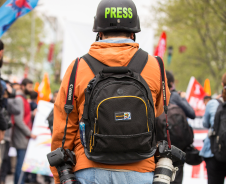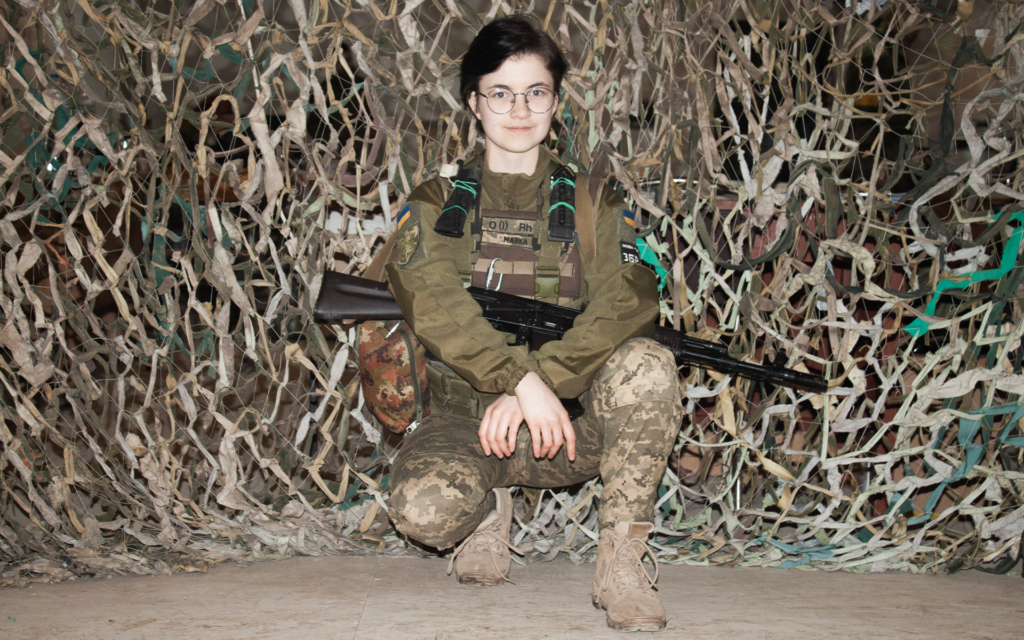
Author: Tetiana Kapustynska, Yulia Salizhenko. 25 November 2022
Lisa is 21 years old. Before February 24, she lived in Lviv with her boyfriend, studied to become a psychologist, and actively volunteered and participated in peaceful campaigns. Lisa is currently serving in the army. She is in the combat zone in the Kharkiv Region and is fighting on several fronts at the same time: against the invaders and for women’s rights. We talked to this brave girl to find out what made her abandon her studies and go to the front, what she does in the army, how she and other women are treated in the units, and what Lisa will do after our victory.
— What did you do before the full-scale invasion?
— I studied at the Department of Psychology of Lviv-based Ivan Franko University in my third year. Now I would be in my fourth year, but I took an academic leave because serving in the armed forces and studying at the same time is a bit difficult. In addition, I have been a volunteer of the international animal protection organization “Open Cages” for more than three years and have repeatedly participated in other eco-initiatives, animal protection campaigns, etc. Activism is a big part of my life.
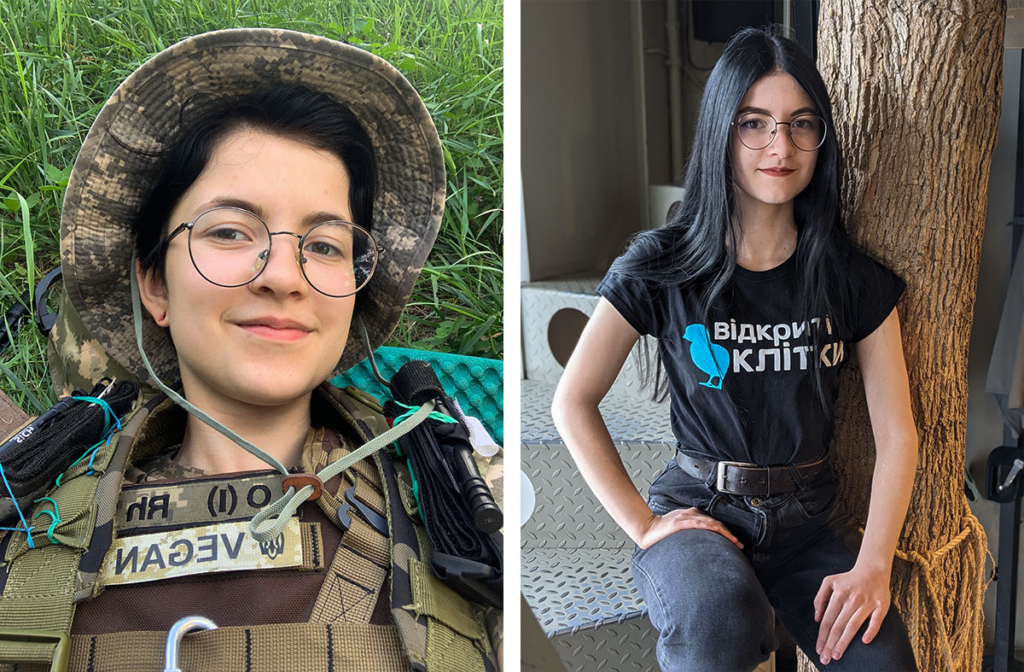
— What changed on February 24 and what did you do on that day?
— The news woke me up. It was not something incomprehensible to me; I more or less understood what was happening. On February 24, my boyfriend and I were still adapting to new realities, while on February 25 we decided to join the ranks of the Armed Forces of Ukraine or the Territorial Defence Unit. Together. This was not some kind of ultimatum; we discussed it earlier. In addition, it was necessary to move somewhere because life was paralyzed at that time – no one went to work or university, and everyone was just thinking about what to do next.
Now my boyfriend is serving with me but in a different unit. We live together and try to stay together. He is progressive, so he was not even supposed not to let me do what I wanted to, unlike my father, who worries a lot. So my boyfriend and I got enlisted together and went through all the stages together.
— And how did this difficult path start?
— First, I started researching. I didn’t understand the field at all, but earlier I thought about signing up for the military and joining the army. It was purely theoretically interesting to me. Thus, I started looking for information on the Internet, what documents needed to be collected, what the procedure looked like, and where to go. I realized that everything was unclear, and you just have to figure it out on the site. I started visiting enlistment centres and asking questions there. I was sent from one place to another, and the final point was the Heroiv Krut Lyceum, where I was actually recruited into the Territorial Defence Unit – the 125th brigade of the TDU/AFU. As a result, I came, signed up, and the very next day we had express training. And a week later, we were transferred to our permanent deployment unit — and there our normal service began, as far as it was possible.
— And why did you choose the army and not volunteering, which is obviously closer to you?
— At night of February 25, I went to volunteer at an administrative facility where displaced persons were received. But there were enough people willing to help. I have been volunteering since long ago, and it’s a very common activity for me, a part of my life. Therefore, I understood that this was not enough for me, I wanted to learn more, and I was ready to exert myself more and take the challenge. I felt that I wanted to be as physically involved in our victory as possible. However, when girls and women ask me what they should know about the service, I ask a counter question about whether they can focus their efforts, which they wanted to focus on the army, effectively on civil volunteering. Because actually, being a woman in the army is difficult. You do not only fight the enemy on the frontline or perform other combat missions, but you also struggle against a rigid military system that still does not accept women.
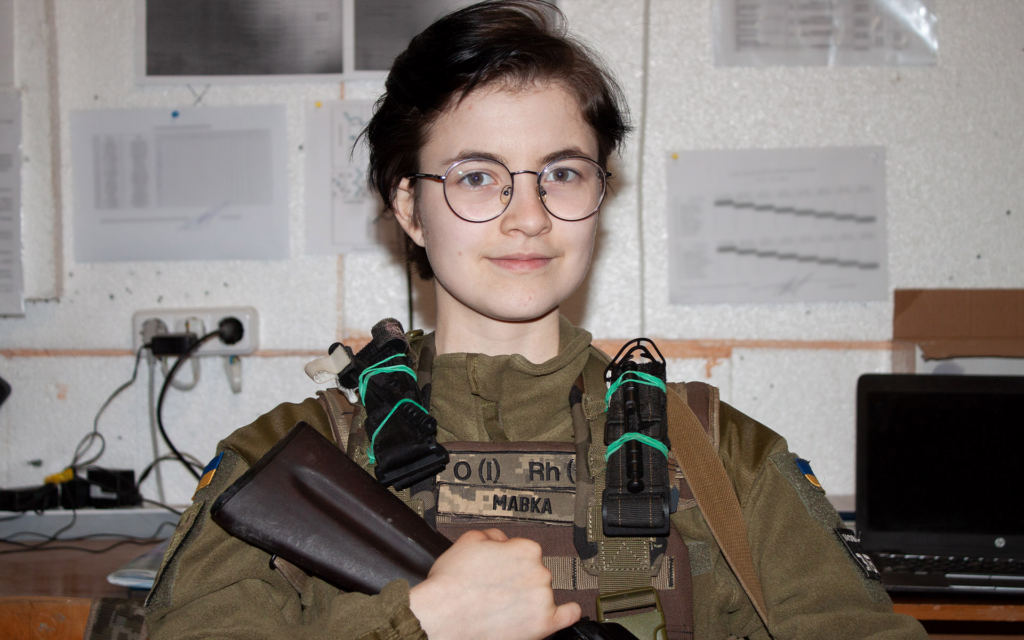
— Were you quickly enlisted or were there any difficulties?
— I was lucky as I was enlisted easily, but I was immediately enrolled in the logistics department. I was made a record keeper, that is, a clerk, that is, I had to deal with documents. Despite all my efforts, I could not move to combat positions. Therefore, my main tasks now are document management; sometimes, I deal with other orders from commanders and superiors. In the beginning, I also conducted a psychological study. After all, I am studying to become a psychologist, and this was close and interesting to me.
— How did your colleagues and loved ones take the news that you were going to the Territorial Defence Unit?
— It was a period when such a decision was understandable for everyone. Of course, they told me to be careful; they emphasized that they were proud of me, but they did not dissuade me. My groupmates were wary of the news, but maybe they just hadn’t considered this option for themselves, so it was a little wild for them. However, this is normal because there is a war in Ukraine, its active phase. Well, my area of communication is mostly activists who strongly invest in the protection of animal and human rights. It was more understandable for them; many of them also either joined the Armed Forces, tried to, or wanted to.
— What motivates you to work on the front and not to stop?
— Many of the military people are going through a crisis because a significant part of the Armed Forces is located in the cities and locations where there are no active hostilities. And we have to do other activities, like document management, which isn’t exactly what you expect when you join the army. Usually, people want to participate in the war actively. I am one of those, too. This is probably one of my motivations because I hope that we will move forward and will still be given the opportunity to fight because our other battalions are more active in this regard. An even greater motivation is the desire to change the Soviet culture that has become entrenched inside us. Much has already changed, judging from the stories of people who served before. But a lot of problems are still there, in particular, as regards the attitude towards women in the army: how they generally advance in the service, where they are assigned, and what opportunities they have. This is such an acute issue that I want to contribute my share and do something to make things better. Because I understand that others will arrive after me, and I have to make their lives as easy as possible. This motivates me not only to do paperwork but to influence the situation from within.
— Can you tell me more specifically how women are treated in this system?
— If you are a woman and join the army, you will have to fight on several fronts at once – and it is not at all about the war with the russian federation. It is about the internal struggle for values, for respect for a woman as a soldier. This requires character, hardening, and stress resistance. All the women who are in our battalion are either clerks, doctors, or cooks. Only one girl worked in a more technical area — in an information and telecommunications unit. But she was also assigned to do paperwork. She is also trying to struggle and change something in the system; that is why she ended up where she is now because of insubordination.
This is constant stigmatization and objectification. They treat you like a sexual subject; they can suddenly hug or kiss you. Not every person knows how to clearly defend their personal boundaries. And when a stocky man or a senior officer is in front of you, it still causes some fear. For example, I can get paralyzed and not know how to behave if such a person shouts at me, despite the fact that I am quite belligerent.
But probably the biggest problem is that women are not perceived as soldiers or partners, as those who came here to serve and fight, not to earn extra attention and collect compliments. It’s more annoying and distracting than helpful. This should not be the case.
It is difficult for women to move up the career ladder, so they are in office management, medicine, or the kitchen. And here, a friendly-corruption scheme flourishes when people primarily pull their friends and acquaintances up the career ladder.
Due to the fact that women are constantly under pressure, they are forced to fight for their rights, particularly for respect to their personal opinion and personal boundaries. Therefore, they are often perceived as hysterical when in fact, they are just trying to get what men already have. Because of these clichés, we cannot move anywhere, and if we do, we are exposed to bad treatment.
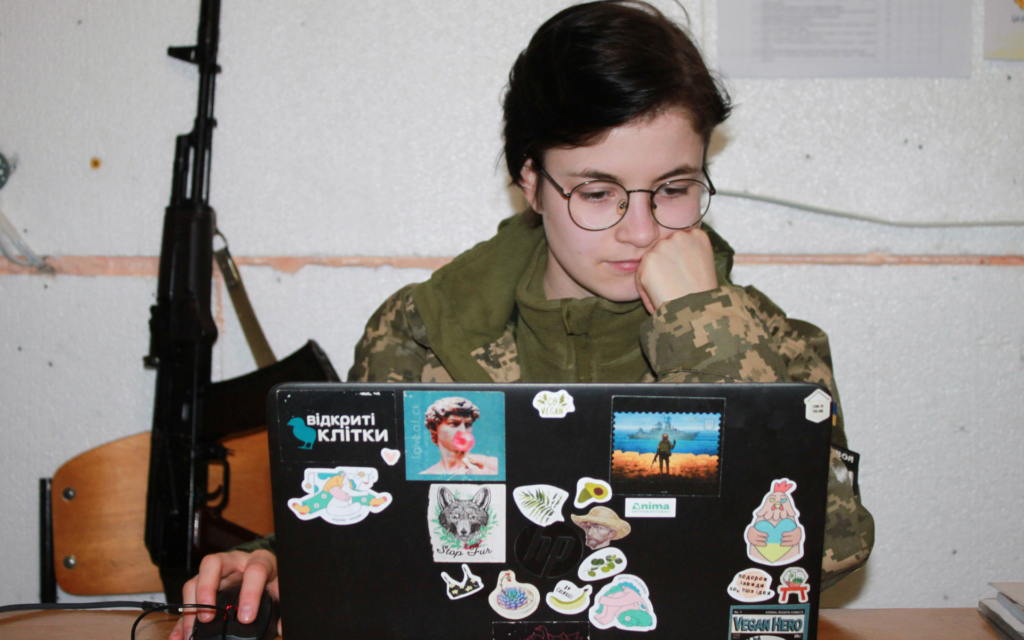
— How do you psychologically tolerate your service?
— No one is really sweet, but everyone has their own behavioural strategies. Not everyone in the army wants to change it, turn the system upside down and make it tolerant or progressive. Most people simply bow their heads. Fooling around is one of the easiest ways to survive. You behave as men expect, and for this, you receive praise, power, and certain leverage. However, you lose your dignity. This is how society has taught women to survive. Struggling is a risky path, playing along is easier, and circumstances constantly remind women of this. So I don’t judge them, even though I don’t like it and it makes my own struggle much more difficult.
Together with women sharing similar values, we think about how to raise important questions. For example, feminist aspects or vegan dry rations — we had a petition regarding the latter and we managed to successfully promote it, not without the help of those who care, in particular, “Open Cages” and Pavlo Vyshebaba (an activist, an envoy for tolerance of UNDP. — Platfor.ma). So little by little, we are moving towards something bigger. Specifically, these are reports and verbal defence of our boundaries, when you make it clear that you will not allow being treated this way. It is not always possible to defend even something simple within the system, but we try.
— I often hear from various people who joined the army, in particular from the media people, that now it is not clear how to return to civilian life. What is your opinion?
— I am actually interested in my further military service. This is not at all what I dreamed of doing in life, but I would like to develop further, take some courses, maintain my shooting skills, etc. But there the point of view actually changes. Now we think differently about certain things. And our values have changed. In fact, many people find it difficult to return to civilian life. Probably in most cases, when it is really acute, there is post-traumatic stress disorder when people cannot imagine their life outside the army.
I feel that the issue of national consciousness has become much more acute for me personally. Not only for me but also for those around me. Since 2014, we have paid with the lives of our soldiers for the possibility to walk down the streets of our peaceful cities. But the trouble is that the majority did not realize the price of peace, and the worst thing is that we chose to stay out of the context, out of politics. I can’t go on like this. And I feel that it will be difficult to deal with the indifference of those around us to the issues of our language, culture, respect for the military, respect for our national and cultural symbols, the reasons behind the war, and the full-scale invasion. In this regard, life will not be the same as before. And I’m afraid to be in crowded places without a weapon, I’ll have to get used to it.
— What is the main value for you now?
— The issue of women’s visibility has become extremely acute for me now. That’s why I started to use feminine forms more actively, to defend my position, and to realize new meanings. I used to think about it too, but the army seems to speed up all these processes.
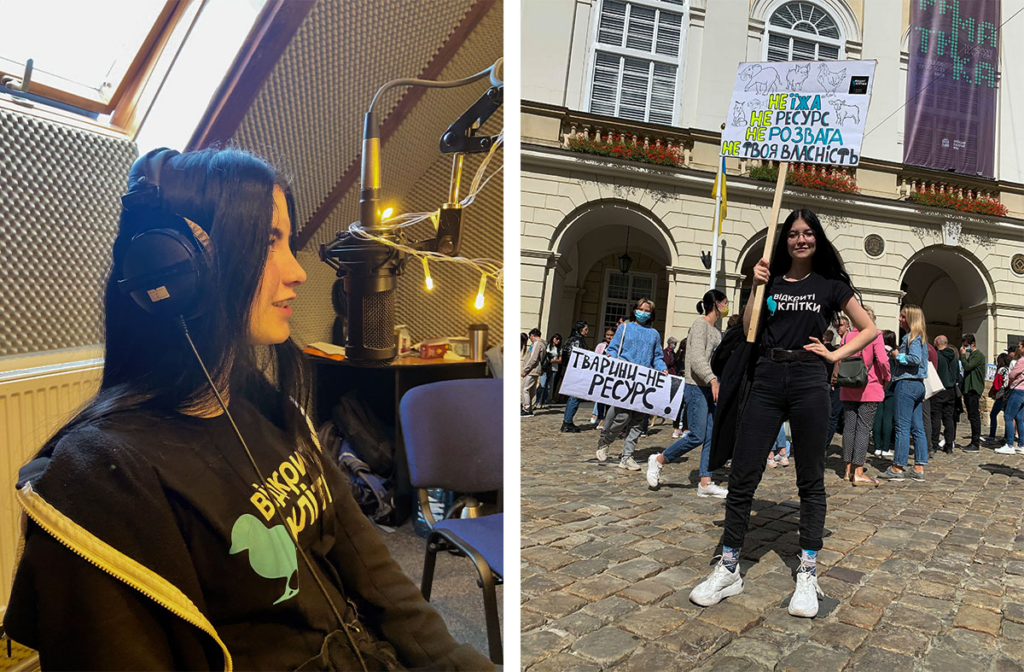
— What do you plan to do after the victory?
— I would really like to finish my studies. I will probably catch up with those dreams that I put aside and thought that I would go back to them someday. I will do what I want, travel, learn new languages, and not hesitate to defend my values even more actively. I’m going to be indifferent. Not only to dream but to turn these dreams into goals and have them come true.
Prepared under the auspices of the Association “Independent Regional Publishers of Ukraine” as part of the implementation of the grant project “The Women in News with WAN-IFRA”. The views of the authors do not necessarily reflect the official position of the partners.

